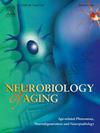睡眠和心血管健康对老年人认知轨迹的影响
IF 3.7
3区 医学
Q2 GERIATRICS & GERONTOLOGY
引用次数: 0
摘要
与年龄相关的睡眠变化与认知能力下降有关,但因果关系尚未确定。有证据表明,心血管健康状况的下降可能是睡眠不足的结果,也是认知能力下降的前兆。这项观察性队列研究使用路径分析来确定心血管疾病风险是否介导或调节睡眠对认知年纵向变化的影响,并使用线性增长模型进行估计。总睡眠时间(TST)、睡眠效率(SE)和慢波活动相对谱功率(SWA);1-4 Hz)和慢振荡(SO;0.5-1 Hz),单通道家庭脑电测量。心血管疾病风险(CVR)以睡眠后1年的10年Framingham风险评分进行评估。结果是在睡眠后2-5年内执行功能(EF)、情景记忆(EM)和处理速度(PS)的年度变化。纳入342名参与者(平均年龄73.5 +/- 5.6岁,51% %为女性)。在所有模型中,较短的TST与CVR增加呈线性相关(βs = -0.18(0.058)- -0.19(0.059),ps<; 0.002)。TST通过CVR间接与EF和PS下降相关,因此短TST与认知能力下降之间的关联部分是由于较高的CVR。经多次比较,其他所有中介和调节效应均不显著。通过较高的CVR发现,短睡眠时间与执行功能和处理速度的较大下降之间存在间接关联,这表明睡眠导致认知能力下降的潜在机制。研究结果支持将充足的睡眠时间放在首位,以在以后的生活中保持心血管和认知健康。本文章由计算机程序翻译,如有差异,请以英文原文为准。
Influence of sleep and cardiovascular health on cognitive trajectories in older adults
Age-related changes in sleep have been associated with cognitive decline, yet causal pathways have not been identified. Evidence suggests reduced cardiovascular health may be a consequence of poor sleep and a precursor to cognitive decline. This observational cohort study used path analyses to determine whether cardiovascular disease risk mediated or moderated effects of sleep on yearly longitudinal change in cognition, estimated with linear growth models. Total sleep time (TST), sleep efficiency (SE), and relative spectral power of slow wave activity (SWA; 1–4 Hz) and slow oscillations (SO; 0.5–1 Hz), were measured with single-channel home EEG. Cardiovascular disease risk (CVR) was estimated as 10-year Framingham Risk Score 1-year post-sleep. Outcomes were yearly change in executive function (EF), episodic memory (EM), and processing speed (PS) over 2–5 years post-sleep. 342 participants (mean age 73.5 +/- 5.6 years, 51 % female) were included. Shorter TST was linearly associated with increased CVR across all models (βs = -0.18(0.058) – -0.19(0.059), ps< 0.002). TST was indirectly associated with EF and PS decline through CVR, such that associations between short TST and cognitive decline were partially due to higher CVR. All other mediating and moderating effects were nonsignificant after multiple comparisons. Indirect associations between short sleep duration and greater decline in executive function and processing speed were found through higher CVR, suggesting a potential mechanism by which sleep leads to cognitive decline. Findings support the prioritization of adequate sleep duration to preserve both cardiovascular and cognitive health in later life.
求助全文
通过发布文献求助,成功后即可免费获取论文全文。
去求助
来源期刊

Neurobiology of Aging
医学-老年医学
CiteScore
8.40
自引率
2.40%
发文量
225
审稿时长
67 days
期刊介绍:
Neurobiology of Aging publishes the results of studies in behavior, biochemistry, cell biology, endocrinology, molecular biology, morphology, neurology, neuropathology, pharmacology, physiology and protein chemistry in which the primary emphasis involves mechanisms of nervous system changes with age or diseases associated with age. Reviews and primary research articles are included, occasionally accompanied by open peer commentary. Letters to the Editor and brief communications are also acceptable. Brief reports of highly time-sensitive material are usually treated as rapid communications in which case editorial review is completed within six weeks and publication scheduled for the next available issue.
 求助内容:
求助内容: 应助结果提醒方式:
应助结果提醒方式:


